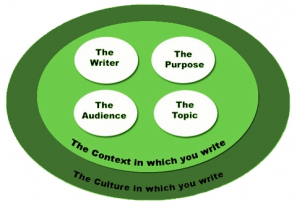
Writing Program at New College
Rhetoric: A (Very) Brief Introduction
“[Rhetoric is] most broadly the study of how people use language and other symbols to realize human goals and carry out human activities.”
-- Charles Bazerman
"We die. That may be the meaning of life. But we do language. That may be the measure of our lives," -
- Toni Morrison
Pursuing your own interests in writing this semester, you will do no less than Bazerman suggests, studying and experimenting with language as a powerful means of inquiry and communication. But writing is even more fundamental to human life than Bazerman suggests, at least according to one of our greatest writers, Toni Morrison.
Rhetoric can be a slippery term. More often than not, the word gets used to mean something like deceptive language, false claims, fakery, or empty words. One can be accused of using rhetoric; perhaps you have heard one politician denounce another for espousing “mere rhetoric” or offering “only rhetoric” when making campaign promises. This is a sad fate for a word with such a long and fascinating history. In fact, rhetoric was once regarded as the pinnacle of a university education.
We want to return to the idea that studying rhetoric is key to academic success, and more, to engaged and thoughtful citizenship. To accomplish this goal, we must first agree upon a definition. While many definitions of rhetoric have existed over the centuries, we offer the following as a beginning. For our purposes, rhetoric is:
- Planning and crafting successful communication appropriate for the given moment.
- Thoughtful, appropriate, and carefully crafted communication.
- The practice of connecting powerfully with audiences.
- The practice of making effective arguments.
- The practice of persuading others.
- Critical analysis of the major perspectives and ideas about any given topic.
This brief overview is just a place to begin, and of course many of these terms will be familiar to you already. Our goal in this section is to develop a shared vocabulary for doing the work of this course, a working vocabulary for writers. Familiarize yourself with all of the terms introduced, and if you are interested, consult the bibliography at the end of this section for further reading suggestions.
The Rhetorical Situation
Let's attempt a big-picture look at rhetoric through reference to what is often referred to as the rhetorical situation. Many useful versions of this model exist, along with a great deal of scholarship, but we like this map, which we found at Minnesota State University, Mankato:

For our purposes, a rhetorical situation refers to any given time and place in which you find yourself with a task or challenge of communication. One way to break such situations into dynamically interacting elements is to identify in each a general topic; a more sharply defined purpose taken up by a writer; and an audience. Expanding our big-picture a bit, we can conceive of every writer and audience as being simultaneously situated within any number of contexts – social, geographic, cultural, and the like. Amidst this complex rhetorical situation, the more you stay focused on your purpose, the better will be the decisions you make about the issue you are addressing.
Concepts in Rhetoric
Like any craft, rhetorical practice requires skill across a range of activities and concepts. And while we have discussed in detail elements of the rhetorical situation above, we want to share some more concepts related to rhetoric, each of which we will work with more carefully as the semester moves along.
The following overview of rhetorical terms intends to provide students with a working vocabulary for rhetorical practice and critical inquiry.
In the end, we realize our review of rhetoric is far too quick, and though we have separated these concepts for the sake of discussion, in practice they are very much connected, as perhaps you have already begun to realize. However, we’re going to do more than simply assume that you are making these realizations. It is now time for your first official writing assignment.
To locate that assignment, please click on the Assignments Tab at the bottom of this page.